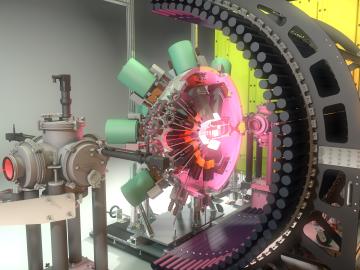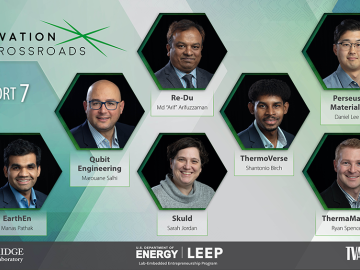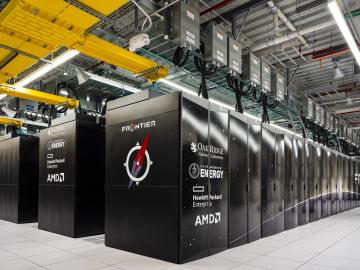
Filter News
Area of Research
- Advanced Manufacturing (2)
- Biology and Environment (5)
- Computer Science (2)
- Energy Science (12)
- Fusion and Fission (1)
- Isotopes (1)
- Materials (22)
- Materials for Computing (1)
- National Security (16)
- Neutron Science (10)
- Nuclear Science and Technology (2)
- Quantum information Science (1)
- Sensors and Controls (1)
- Supercomputing (23)
News Type
News Topics
- (-) Artificial Intelligence (35)
- (-) Clean Water (2)
- (-) Cybersecurity (17)
- (-) Physics (26)
- (-) Security (12)
- 3-D Printing/Advanced Manufacturing (48)
- Advanced Reactors (12)
- Big Data (8)
- Bioenergy (25)
- Biology (26)
- Biomedical (17)
- Biotechnology (10)
- Buildings (15)
- Chemical Sciences (35)
- Composites (12)
- Computer Science (63)
- Coronavirus (17)
- Critical Materials (11)
- Education (3)
- Element Discovery (1)
- Energy Storage (43)
- Environment (38)
- Exascale Computing (13)
- Fossil Energy (1)
- Frontier (16)
- Fusion (17)
- Grid (16)
- High-Performance Computing (32)
- Isotopes (20)
- ITER (2)
- Machine Learning (13)
- Materials (60)
- Materials Science (56)
- Mercury (2)
- Microelectronics (1)
- Microscopy (17)
- Molten Salt (3)
- Nanotechnology (29)
- National Security (18)
- Neutron Science (54)
- Nuclear Energy (28)
- Partnerships (31)
- Polymers (13)
- Quantum Computing (13)
- Quantum Science (31)
- Simulation (10)
- Space Exploration (3)
- Statistics (1)
- Summit (22)
- Transportation (26)
Media Contacts

Scientists at ORNL used their expertise in quantum biology, artificial intelligence and bioengineering to improve how CRISPR Cas9 genome editing tools work on organisms like microbes that can be modified to produce renewable fuels and chemicals.

As vehicles gain technological capabilities, car manufacturers are using an increasing number of computers and sensors to improve situational awareness and enhance the driving experience.

The Department of Energy’s Oak Ridge National Laboratory announced the establishment of the Center for AI Security Research, or CAISER, to address threats already present as governments and industries around the world adopt artificial intelligence and take advantage of the benefits it promises in data processing, operational efficiencies and decision-making.

Technologies developed by researchers at ORNL have received six 2023 R&D 100 Awards.

Timothy Gray of ORNL led a study that may have revealed an unexpected change in the shape of an atomic nucleus. The surprise finding could affect our understanding of what holds nuclei together, how protons and neutrons interact and how elements form.

Seven entrepreneurs will embark on a two-year fellowship as the seventh cohort of Innovation Crossroads kicks off this month at ORNL. Representing a range of transformative energy technologies, Cohort 7 is a diverse class of innovators with promising new companies.

Innovations in artificial intelligence are rapidly shaping our world, from virtual assistants and chatbots to self-driving cars and automated manufacturing.

An innovative and sustainable chemistry developed at ORNL for capturing carbon dioxide has been licensed to Holocene, a Knoxville-based startup focused on designing and building plants that remove carbon dioxide

Led by Kelly Chipps of ORNL, scientists working in the lab have produced a signature nuclear reaction that occurs on the surface of a neutron star gobbling mass from a companion star. Their achievement improves understanding of stellar processes generating diverse nuclear isotopes.

Kelly Chipps, a nuclear astrophysicist at ORNL, has been appointed to the Nuclear Science Advisory Committee, or NSAC. The committee provides official advice to DOE and the National Science Foundation, or NSF, about issues relating to the national program for basic nuclear science research.


